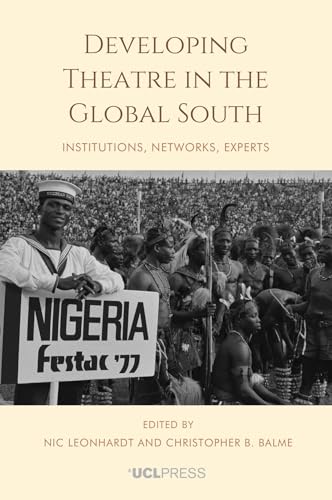
Developing Theatre in the Global South: Institutions, Networks, Experts
Nic Leonhardt, Christopher B. Balme
Questions & Answers
The institutionalization of theatre in emerging nations during the Cold War significantly influenced the development of theatre in the Global South. International organizations like ITI and UNIMA fostered global networks, enabling connections across the North, East, and South despite ideological divisions. This facilitated the exchange of expertise and practices, allowing the Global South to craft syncretic forms showcasing local cultures within a global context. The establishment of national theatres, supported by Western philanthropy and government policies, provided infrastructure for professional theatre. However, this also led to the promotion of European professional models, sometimes at the expense of local traditions. The introduction of workshops and new pedagogical tools furthered professionalization but also reinforced certain Western theatrical norms. Overall, the institutionalization of theatre in the Global South during the Cold War period contributed to its professionalization and globalization, while also raising questions about cultural authenticity and dependency.
The concept of 'epistemic community' played a crucial role in the professionalization and internationalization of theatre in the Global South. It refers to networks of experts who advise policymakers and governments on complex issues, often with a high degree of international organization. In the context of theatre, this concept facilitated the formation of transnational networks among artists, scholars, and educators, fostering a shared understanding and practice of theatre.
These networks, akin to scientific and technical epistemic communities, allowed for the exchange of knowledge and resources, which was vital for the development of professional theatre in the Global South. They provided a platform for collaboration, enabling artists to learn from each other and adapt Western theatrical practices to local contexts. This process of knowledge sharing and adaptation contributed to the professionalization of theatre in the region, as well as its internationalization, allowing for the exchange of ideas and practices across borders. The concept of epistemic community thus served as a foundational element in the global theater community, promoting the growth and evolution of theater in the Global South.
The relationships between Western and local cultural practices have significantly shaped the development of theatre in the Global South. Initially, Western models, particularly European theatre, were adopted and adapted to suit local contexts, leading to the emergence of syncretic forms. This process allowed for the integration of indigenous performance traditions and cultural elements, fostering a unique identity for theatre in the Global South. However, this also led to debates about cultural authenticity and the potential for Western influence to overshadow local practices.
International organizations and philanthropic foundations played a crucial role in promoting Western theatre practices, often at the expense of local traditions. This technopolitical intervention influenced the construction of national theatres and the introduction of new pedagogical tools. The global circulation of ideas and expertise facilitated the emergence of a worldwide theatrical epistemic community, where local practitioners could engage with and adapt Western methods to their own cultural contexts.
Despite challenges and tensions, these interactions have contributed to the professionalization and diversification of theatre in the Global South, fostering a rich tapestry of cultural expressions that reflect both local and global influences.
The 'post-development' critique challenges the traditional approach to development, emphasizing the inequalities between the Global North and South. This critique has significant implications for the study and practice of theatre in the Global South:
-
Re-evaluation of Theatrical Practices: The critique encourages a re-examination of theatre practices that were previously seen as tools for development. This re-evaluation may lead to a shift in focus from the functional aspects of theatre to its cultural and political dimensions.
-
Decolonization of Theatrical Knowledge: By questioning the dominance of Western theories and practices, the critique promotes the development of indigenous theatrical traditions and knowledge systems.
-
Critical Engagement with Power Dynamics: The critique encourages theatre practitioners and scholars to critically engage with power dynamics, including colonial legacies, economic disparities, and political structures, in their work.
-
Community-Centric Approaches: The critique may lead to a greater emphasis on community-based theatre practices that prioritize local concerns and empower marginalized groups.
-
Transnational Collaboration: The critique may foster transnational collaborations that bridge the Global North and South, promoting a more equitable exchange of ideas and resources.
-
Long-Term Sustainability: The critique emphasizes the need for sustainable theatrical practices that are not dependent on external funding or interventions, ensuring the longevity of theatre in the Global South.
Expert networks and international collaborations have significantly contributed to the institutionalization and evolution of theatre in the Global South by fostering knowledge exchange, professionalization, and cultural exchange. International organizations like ITI and UNESCO facilitated global networks, enabling practitioners from the Global North, East, and South to connect despite Cold War divisions. These networks supported the development of national theatres, training programs, and educational tools, like workshops, which became pivotal in professionalizing theatre practices. The Rockefeller Foundation's support for theatre training and equipment in post-war periods also played a crucial role. Transnational networks, such as those of Augusto Boal's Theatre of the Oppressed, allowed methodologies to adapt to diverse contexts, promoting cultural democracy and social development. These collaborations have not only shaped theatre institutions but also influenced the content and form of theatre, making it more inclusive and reflective of local cultures and global concerns.